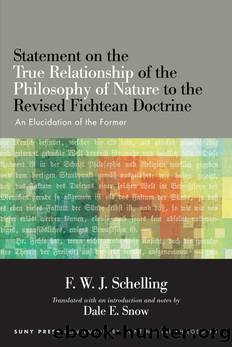Statement on the True Relationship of the Philosophy of Nature to the Revised Fichtean Doctrine by unknow

Author:unknow
Language: eng
Format: epub
ISBN: 9781438468655
Publisher: SUNY Press
Published: 2018-07-15T05:00:00+00:00
Herr Fichte had adopted, not this perspective exactly, but still a speculative theory of freedom, for the /7, 83/ purpose of explaining his five possible standpoints, but it did not serve to also [explain] the dead, fixed existence, the splitting, the infinite many and absolute multiplicity of his world (see the specific explanation on p. 128).
That a theory of freedom which has its ground in God is in complete contradiction with all earlier Fichtean teachings cannot be disputed by anyone. â In general the aforementioned work of Herr Fichteâs seems to have found a better approach than his other works, and this is easy to understand, since in this the great significance his doctrine has had for the age is completely acknowledged and demonstrated with real interest. It also contains (p. 41) the Fichtean interpretation of the absolute form as λÏγοÏ.
Herr Fichte has spoken a few times, with clear reference to himself, of being robbed and decried by precisely those who are robbers. We do not know exactly who, today, would take such a great interest in enriching himself with Herr Fichteâs ideas: but he who in the most recent three writings is the decried, and who the decrier, seems clear as day, as everyone familiar with the philosophical literature would admit, [indeed] that this artifice has been used against few with greater shamelessness than against the author of this work.
Under which of his five possible standpoints do these belong, or rather, under which of them belongs his conviction that the /7, 84/ intended division, infinitude, etc., are completely actual and real at least in consciousness? For us, as we have repeatedly said to him, it makes no difference whether that which he calls the material world is outside us or merely in us and real for us. In both cases it has reality in general, which we do not attribute to it either objectively or subjectively, but rather entirely deny. Thus he, who from our perspective ascribes true reality to the material world â stands, although he thinks he find himself on the highest of his five standpoints, precisely on the lowest of all. â He is the one who wishes to retain the material world by allowing it to be created by the absolute consciousness; he does not need it as living, but certainly as dead, he â does not divinize it, for it remains always and eternally nondivine, but it has for him as an infinite divisibility such a reality through the form that it cannot even be changed by God himself, thus [is] an enduring reality, next to and with God.
In addition to the general advantage of placing the world qua material world high enough to render it something unavoidable and undeniable, this theory also offers the absolute consciousness the special favor of not just maintaining but distinguishing the objective, fixed being from the philosophy of nature â against her tendency to claim that all being, in and of itself and considered in its original essence, is divine life.
Download
This site does not store any files on its server. We only index and link to content provided by other sites. Please contact the content providers to delete copyright contents if any and email us, we'll remove relevant links or contents immediately.
What's Done in Darkness by Kayla Perrin(25490)
Shot Through the Heart: DI Grace Fisher 2 by Isabelle Grey(18208)
Shot Through the Heart by Mercy Celeste(18151)
The Fifty Shades Trilogy & Grey by E L James(17767)
The 3rd Cycle of the Betrayed Series Collection: Extremely Controversial Historical Thrillers (Betrayed Series Boxed set) by McCray Carolyn(13179)
The Subtle Art of Not Giving a F*ck by Mark Manson(12896)
Scorched Earth by Nick Kyme(11821)
Stepbrother Stories 2 - 21 Taboo Story Collection (Brother Sister Stepbrother Stepsister Taboo Pseudo Incest Family Virgin Creampie Pregnant Forced Pregnancy Breeding) by Roxi Harding(11012)
Drei Generationen auf dem Jakobsweg by Stein Pia(10207)
Suna by Ziefle Pia(10176)
Scythe by Neal Shusterman(9249)
International Relations from the Global South; Worlds of Difference; First Edition by Arlene B. Tickner & Karen Smith(8599)
Successful Proposal Strategies for Small Businesses: Using Knowledge Management ot Win Govenment, Private Sector, and International Contracts 3rd Edition by Robert Frey(8404)
This is Going to Hurt by Adam Kay(7680)
Dirty Filthy Fix: A Fixed Trilogy Novella by Laurelin Paige(6444)
He Loves Me...KNOT by RC Boldt(5795)
How to Make Love to a Negro Without Getting Tired by Dany LaFerrière(5366)
Interdimensional Brothel by F4U(5298)
Thankful For Her by Alexa Riley(5148)
